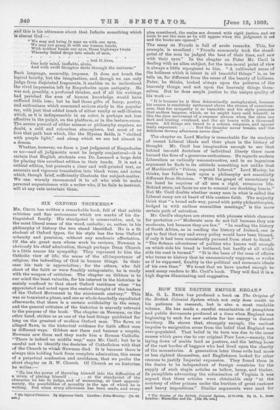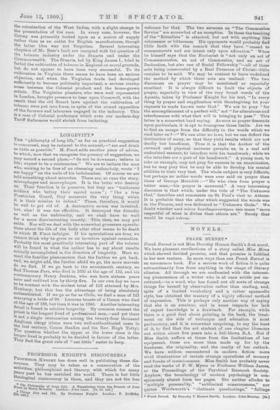HOW THE BRITISH EMPIRE BEGAN.*
Mn. G. L. BEER has produced a book oai The Origins of the British Colonial System which not only does credit to his patience in research, but is also a most readable- volume. He has made a careful examination of pamphlets. and public documents produced at a time when England was beginning to seek for new outlets for her energy in distant. territory. He shows that, strangely enough, the earliest. impulse to emigration arose from the belief that England was- over-populated. That belief in its turn was due to the same' causes which gave rise to our original Poor Law,—namely, ths laying down of arable land as pasture, and the letting loose' of the vast hordes of beggars who had lived upon the charity of the monasteries. A generation later these evils bad more or lees righted themselves, and Englishmen looked for other. reasons to justify Imperial expansion. They found thorn in the desire to be independent of foreign countries for the. supply of such staple articles as tallow, hemp, and timber. In pamphlets advocating the colonisation of Virginia it wail' argued that these articles were obtainable only "at the courtesy of other princes under the burthen of great customs and heavy impositions." Similar arguments were used for.
• The Origins of tit. British Colonial System, le 78-1000, By G. L. I3oar. London Macmillan and Co. [128. 64 net.]
the colonisation of the West Indies, with a slight change in the presentation of the case. In every case, however, the Colony was primarily looked upon as a source of supply rather than as an outlet for English manufactures, though the latter idea was not forgotten. Several interesting chapters of Mr. Beer's book are occupied with the question of the tobacco industry under the Stuarts and under the Commonwealth. The Stuarts, led by King James I., tried to forbid the cultivation of tobacco in England on moral grounds, but do not appear to have been very successful. To its cultivation in Virginia there seems to have been no serious objection, and when the Virginian trade had developed sufficiently to become politically important, a serious rivalry arose between the Colonial product and the home-grown artiole. The Virginian planters, who were well represented In London, brought pressure to bear upon Cromwell, with the result that the old Stuart laws against the cultivation of tobacco were put into force, in spite of the armed opposition of the farmers and labourers engaged in the industry. This le a case of Colonial preference which even our modern-day Tariff Reformers would shrink from imitating.











































 Previous page
Previous page